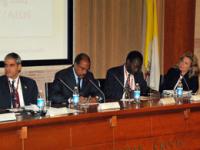
UNAIDS Executive Director Michel Sidibé in panel discussion with Dr Deborah Birx, Director of the Global AIDS Program, CDC, Dr Georges Tiendrebeogo, Royal Tropical Institute, Cordaid and Dr Miguel H. Diaz, U.S. ambassador to the Holy See. Rome, 14 October 2009.
Credit: US embassy to the Holy see
The Executive Director of UNAIDS, Michel Sidibé took part in a meeting on prevention and early treatment of HIV and TB in young children. The conference is being held at the Pontificia Universita’ della Santa Croce in Rome, and is organized by Caritas Internationalis and the Embassy of the United States of America to the Holy See.
The newly appointed president of the Vatican’s Pontifical Council for Health Care Workers, Archbishop Zygmunt Zimowski, opened the meeting.
Addressing the conference, Mr Sidibé stressed the importance of the faith community in delivering health care services and spreading hope, acknowledging that 30-70 percent of all health care in African countries is provided by faith based organizations (FBOs).
We have one of the most powerful networks on earth as key partners: the wide-reaching, dedicated communities of faith, driven by deep devotion to social justice and human rights.
Michel Sidibé, UNAIDS Executive Director
In partnership with faith based organizations the virtual elimination of mother to child transmission of HIV could be possible, said Mr Sidibé: “We have the technology. We have the will. And we have one of the most powerful networks on earth as key partners: the wide-reaching, dedicated communities of faith, driven by deep devotion to social justice and human rights.”
Mr Sidibé also highlighted the unique position of religious leaders as gatekeepers of large communities, to mobilize and sustain a vibrant grassroots movement in the AIDS response – a movement which urgently needs reinvigorating to call for prevention of mother-to-child transmission and integrated TB and HIV services at a national level.
With an estimated 370,000 children being born with HIV in sub-Saharan Africa every year and only 45 percent of HIV positive pregnant women receiving ARV prophylaxis on the continent, the meeting offers an opportunity to promote dialogue among Roman Catholic Church leaders on the urgent need to expand access to testing and treatment for children living with HIV and TB and to promote greater coverage of measures to prevent mother to child transmission of HIV.
During his visit to Rome, Mr Sidibé also had the opportunity to meet with representatives from Sant’ Egidio, the largest Catholic Lay volunteer organization in the world which provides 70,000 people with ART and nutrition in 10 sub-Saharan countries.
The conference will run from 14 to 16 of October and brings together medical doctors, member of religious orders, heads of Catholic run AIDS projects, professors of Theology, as well as representatives for the pharmaceutical industry.
It was co-sponsored by the Pontifical Council for Health Care Workers, UNAIDS, World Health Organization Stop TB Department, Stop TB Partnership, Health Commission of the Unions of Superiors General, and the ‘Bambino Gesù Children’s Hospital.
Preventing mothers from dying and babies from becoming infected with HIV is one of the key priority areas in the UNAIDS outcome framework 2009-2011




